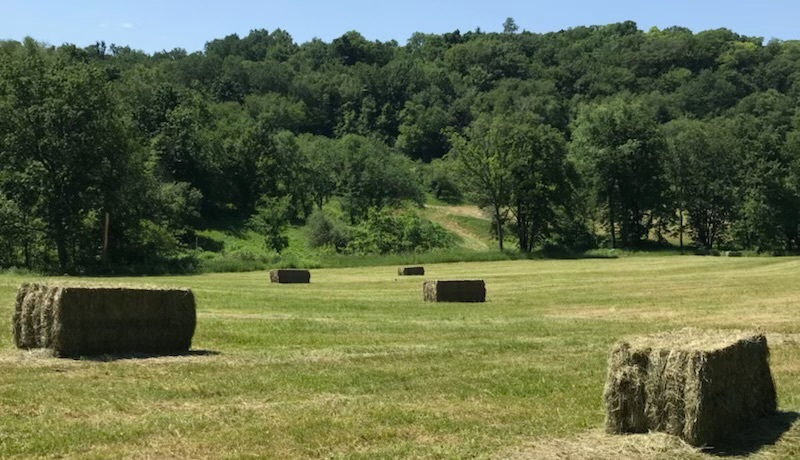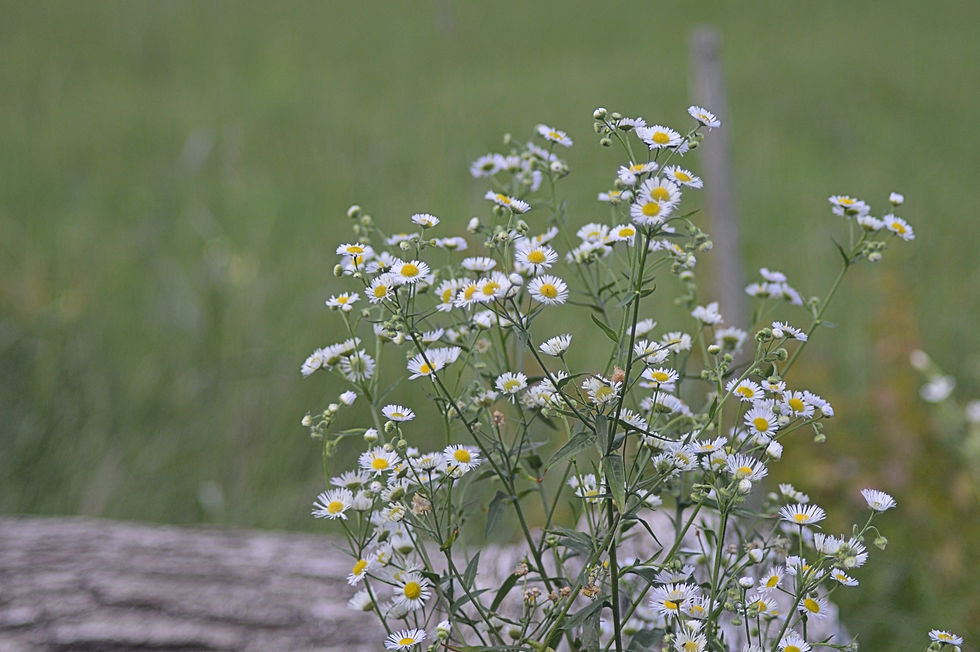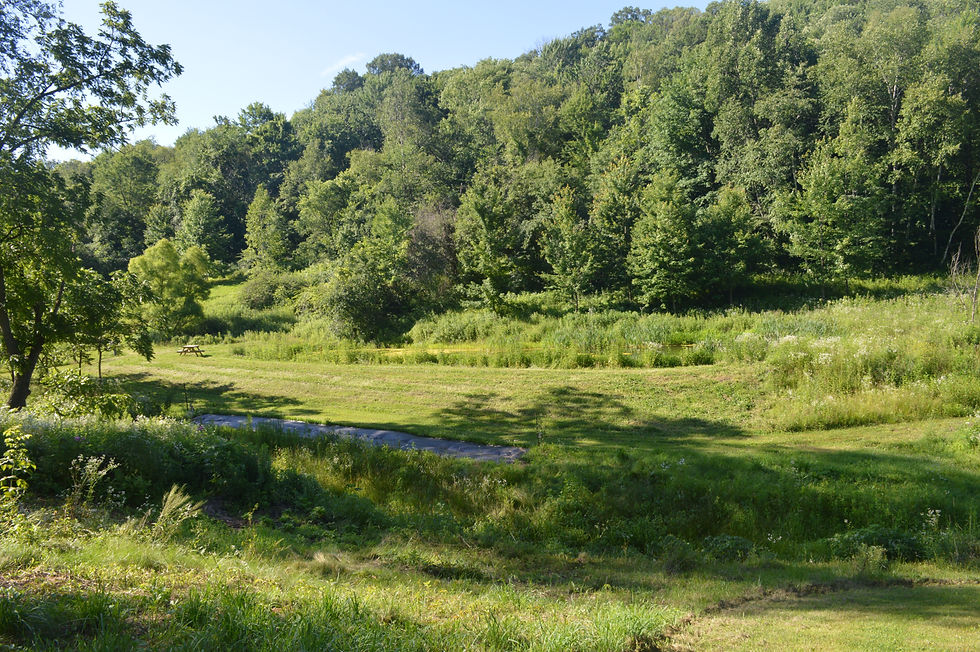Stuck in the Mud
- Rebecca Clancy
- Jun 8, 2022
- 5 min read
Updated: Jun 9, 2022

In the spring and summer months, it tends to get really overgrown around here. It’s no small effort to keep things mowed down. It amounts to having the right equipment. Having the right equipment, however, is tricky business. There is a whole breakout session at the MOSES Conference devoted to having the right equipment. Even having attended it, some trial and error proved unavoidable. “You already have a UTV?” a fellow attendee asked. “What you need is a pull-behind brush hog,” he informed me with certainty.
So I sprang for a pull-behind brush hog. We hated the thing from the get go. You couldn’t back it up; that caused it to jack knife. It was bad on hills. Imagine your UTV wheels, even in low gear, spinning and inching along, not knowing if you were going to make it up or not (and you couldn’t back it up). It was hard to maneuver. When you got to the end of a row you had to cut an impossibly wide swath just to turn it in the other direction. Brush hogging over the cord was unavoidable, which meant we had to stop working in order to splice and tape it. A wingman was necessary, “Did I hit the multiflora rose?” I would holler at May over the deafening racket it made. May, looking over her shoulder, would frown and give me a thumbs down.
Add to that, it ran on gas. We are moving away from gas whenever possible. For one thing, it is exorbitantly expensive. For another, it’s a hassle to take the containers to the gas pump. For another, it makes you dependent upon Big Gas. And beyond this, technology is evolving beyond it.
I know. That’s counterintuitive. In the past, only amateurs used battery and electric machinery, while professionals used gas – often mounted on their backs. All that is changing. Next time you find yourself at ACE or Home Depot, look around for the EGO products. They’re all battery operated, and boy do they ever blow gas away. We have the chainsaw, the leaf blower, and the weed whipper.
I actually look forward to weed whipping bull thistle in the ditch of the 650 foot swale. Bull thistle when you weed whip it spits itself in your face. I don’t care that I return home green. Having that kind of power at my disposal is a rush.
Bottom line, we ditched (sold) the pull-behind brush hog. With the proceeds we purchased a brush mower that attaches behind the tractor. It is powered by the tractor, so requires no gas (admittedly, the tractor requires gas, but it cuts our use in half). It handles the hills. It is surprisingly maneuverable. It is indestructible. It makes no deafening racket. In fact, it purrs like a kitten.
We were so happy with it we were eager to make full use of it – perhaps a bit too eager. The livestock field is an interesting ecosystem. An oak savanna that we are in the process of restoring sits on the hills that surround it, but it tends to be wet in the lowlands.
Avi, who was at the wheel driving through the lowlands, hit a spring. The tractor instantaneously began to submerge after the fashion of a submarine. In those initial adrenaline laced moments of panic, she did everything wrong. What she should have done was lock the differential, put it in four wheel drive, and back it up slowly. What she locked instead was her jaw while putting the pedal to the metal. In an instant or two, we could see only the tops of the tires. We were stuck in the mud.
In my gut I realized that my failsafe Youtube videos would in this case be to no avail. Still, we went through the motions. We dumped riprap around the tires. We made crude roadways of firewood behind them.
At the following method I drew the line:
Even if we went to the length of cutting down a tree and chaining it to the tractor tire, the tractor in the video bucked like a bronco. We were right near a fence line. Taking out a fence panel was not an option. The goats were in attendance, tails twitching, sidelining the whole drama. They doubtless perceived this as a chance to do another runner, not so much because they actually wanted to escape - they live like royalty - but because goats are by nature tricksters. But we had lived that hell. We were not going to live it again if we could help it.
We had no recourse but to call for help. I was extremely reluctant to do so. If I were a seasoned farmer, well known and proved around these parts, it would be less humiliating. But a newbie farmer? A woman from the big city?
But on the other hand, the king of all farmers, Joel Salatin, wrote in his masterpiece Anyone Can Farm that there was no shame in it. He himself called for help to pull a 600 pound calf out of a swimming pool using a round bale lifter. My blunder was surely more respectable than his, I told myself.
So I called for help. The man I called, who has helped me immeasurably in the past, was on vacation, but the day after he returned he dropped by. His right arm was in a sling. I assumed it was a minor sprain. In fact his collar bone had separated from his sternum and both were broken. It proved no deterrent for him.
He assessed the situation and returned with his son and skid steer. In a few minutes, “pop!” the tractor was free. I offered to pay him. He waved the money away. I told him I’d give it to his son. “He won’t take it,” he said. He didn’t. He didn’t seem to care that I was an embarrassing wannabe. He wouldn’t have cared if I were a Martian. All he cared about was that someone needed help.
I’ve come to realize that this is how the folks around here are bred up. I guess you could call it neighborliness, but it’s deeper than that. Neighborliness in the suburbs is sharing a cup of sugar. These people would do anything for you. There’s no ask too big. And the more profusely you thank them the gruffer their nod. Because just as they are not in it for money, they are not in it for thanks. They are in it simply to help. It’s how they’re bred up.
I guess they have come to learn from their lived experience down through the generations that interdependence is a truth to be lived out.
It makes it a worthwhile exercise to examine how you’ve been bred up and how you’ve bred up your offspring. The people in my new homeland have been bred up to be Good Samaritans, so I know first hand how it feels to be the beneficiary of a Good Samaritan. It feels like an echo of the divine.




Wonderful story Becca was just thinking about how busy you must be 😊